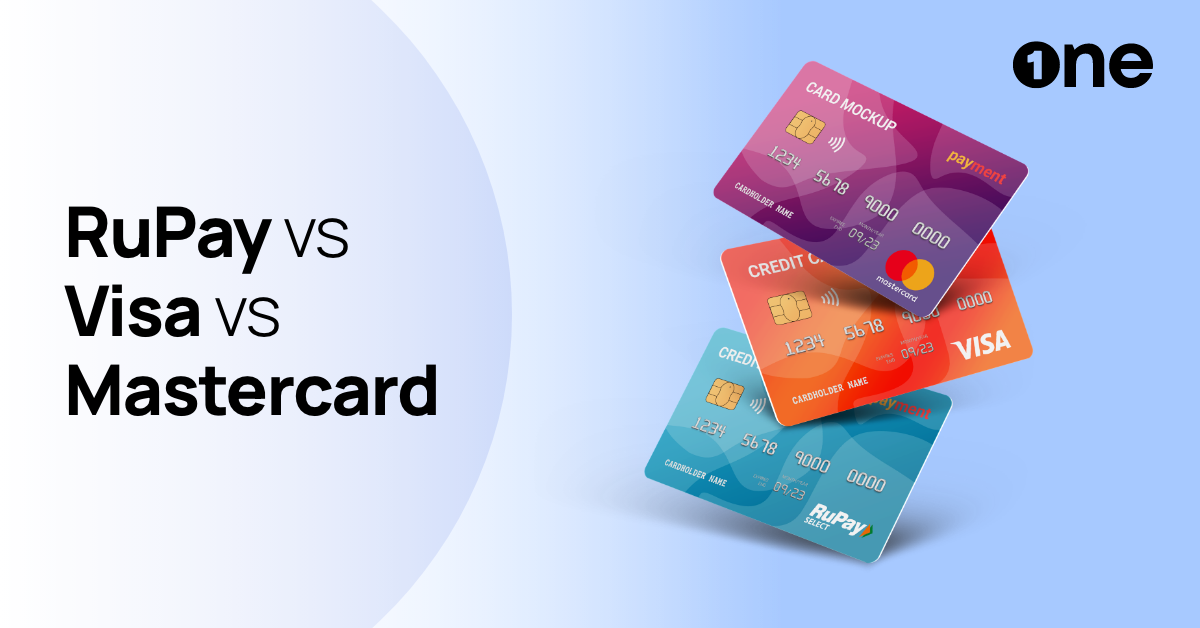RuPay vs Visa vs Mastercard: How Are They Different?
By OneCard | August 04, 2024

In this era of digital money, i.e., credit/debit cards and cashless transactions, three names stand out as power players in India. They are RuPay, Visa, and Mastercard. These payment networks enable us to conduct transactions with ease. While all three of these have several overlaps in terms of functionality and usage, there are some key distinctions between them. This blog goes over the different features between RuPay vs Visa and Mastercard.
Table of contents:
RuPay – The Homegrown Player
The National Payment Corporation of India (NPCI) launched RuPay in March 2012. Since then, RuPay has been making waves as India’s contender to international credit card networks. It offers seamless transactions across the country with lower transaction fees.
RuPay is more suitable for domestic transactions. With its growing acceptance across platforms, it ensures that you enjoy the benefits of a credit card no matter where you are in the country.
Visa – The Global Companion
Visa is a name synonymous with convenience. With its worldwide acceptance, you are always close to a point of sale, offering unrivalled accessibility and a range of financial services.
Visa is a versatile card that extends beyond borders. This credit card offers a comprehensive suite of benefits, including reward programs, travel insurance, and more. When comparing RuPay vs Visa, Visa is more suitable for a lifestyle that is not bounded by geography and allows you to explore the world easily.
Mastercard – The Lifestyle Enabler
Mastercard is a reliable ally in the credit card space. It is another go-to choice for financial flexibility and a trendy lifestyle. Known for its range of credit cards, Mastercard ensures that it is not just a means of payment but a door to exclusive privileges.
From premium travel rewards to exclusive dining experiences, Mastercard goes the extra mile to enhance your lifestyle. Mastercard offers ways to elevate your everyday experiences, from discounted tariffs at luxurious hotels to special offers on jewellery shopping.
ALSO READ: What are the Different Types of Credit Cards?
The Right Card for Your Needs
Now, let’s take the RuPay vs Visa vs Mastercard debate a step further and take a look at how they fare with these specific factors:
1. Acceptance
RuPay cards are a product of the Indian fintech revolution, while Visa and Mastercard are longstanding global players. In terms of RuPay vs Visa, the former is accepted all across the country, making it prime for domestic payments. Mastercard and Visa points-of-sale are mostly limited to India’s metros and Tier 1 and 2 cities.
2. Processing Time
While comparing the processing time of RuPay vs Visa (or Mastercard), RuPay is considerably faster—processed within 24 hours of the transaction. This is because the verification of data occurs within the country. On the other hand, for the international gateways, it takes about 2 to 3 working days. This is especially true when you’ve applied for a refund on a transaction.
3. Fees and Charges
RuPay offers its services to banks for free, unlike Visa or Mastercard, which impose quarterly and annual fees. So when it comes to transaction fees for RuPay vs Visa, RuPay charges no service fees to Indian banks. However, banks may levy service charges on all credit/debit cards for customers.
4. Security
While all three networks are secure, RuPay processes and shares your financial data on Indian networks, reducing the risk of potential mishandling of data.
In closing, there is no doubt that the RuPay vs Visa vs Mastercard debate will go on. But essentially, they all enable you to securely carry out transactions both in India and abroad. While each of them has its own set of perks and limitations, consider the features that best suit your needs. RuPay fits the bill for smoother domestic transactions. But if your transactions are often international, then Visa or Mastercard might suit you best.
ALSO READ: Benefits of RuPay Credit Card
**Disclaimer: The information provided in this webpage does not, and is not intended to, constitute any kind of advice; instead, all the information available here is for general informational purposes only. FPL Technologies Private Limited and the author shall not be responsible for any direct/indirect/damages/loss incurred by the reader for making any decision based on the contents and information. Please consult your advisor before making any decision.



Sharing is caring 😉